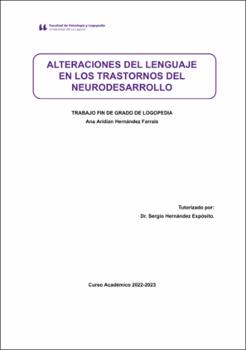Alteraciones del lenguaje en los trastornos del neurodesarrollo
Date
2023Abstract
Existe un elevado consenso científico acerca de que los niños con trastornos del
neurodesarrollo (TND) tienen importantes déficits cognitivos entre los que destacan por su
importancia para el desarrollo autónomo las dificultades en el lenguaje que muestra esta
población. El objetivo central de este trabajo ha sido la caracterización lingüística de una
muestra representativa de niños que cumplían criterios diagnósticos de TND. Para ello
hemos administrado una exhaustiva batería neuropsicología conducente a evaluar el
lenguaje así como la inteligencia, la atención y la velocidad de procesamiento a una
muestra de 40 niños: 10 con Leucemia Linfoblástica Aguda (LLA; Medad=9,60 ,
SDedad=1,776); 10 con Tumores en el Sistema Nervioso Central (TSNC; Medad=9,80 ,
SDedad=1,932); 10 con Trastorno del Desarrollo del Lenguaje (TDL; Medad= 10,30 ,
SDedad=1,494) y 10 con Trastorno del Espectro Autista (TEA; Medad=9,20 , SDedad=1,317). La
ejecución de estos cuatro grupos fue contrastada con el rendimiento experimentado por un
grupo control de desarrollo típico formado también por 10 niños (C; Medad=10,30 ,
SDedad=1,949). El conjunto de resultados obtenidos pone de manifiesto, en términos
generales, que los cuatro grupos con TND tienen un peor rendimiento en lenguaje que el
grupo de C con algunas diferencias entre ellos. Este trabajo pone de manifiesto la
necesidad de identificación e intervención temprana en las dificultades en lenguaje en los
niños con TND en aras a prevenir futuros déficits cognitivos. Los resultados obtenidos son
interpretados en el marco conceptual de la Neuropsicología infantil y su interés por estudiar
la relación cerebro conducta en el contexto dinámico del desarrollo cerebral. There is a high scientific consensus that children with neurodevelopmental disorders (NDD)
have important cognitive deficits, among which the language difficulties shown by this
population stand out for their importance for autonomous development. The main objective
of this study was the linguistic characterisation of a representative sample of children who
met the diagnostic criteria for NDD. To this end, we administered an exhaustive
neuropsychological battery to assess language as well as intelligence, attention and
processing speed to a sample of 40 children: 10 with Acute Lymphoblastic Leukaemia
(LLA; Mage=9,60 , SDage=1,776); 10 with Central Nervous System Tumours (TSNC;
Mage=9,80 , SDage=1,932); 10 with Developmental Language Disorder (TDL; Mage= 10,30 ,
SDage=1,494) and 10 with Autistic Spectrum Disorder (TEA; Mage=9,20 , SDage=1,317). The
performance of these four groups was contrasted with the performance of a typically
developing control group of 10 children (C; Mage=10,30 , SDage=1,949). The set of results
obtained shows, in general terms, that the four groups with NDD have a worse performance
in language than the TD group, with some differences between them. This work highlights
the need for early identification and intervention in language difficulties in children with NDD
in order to prevent future cognitive deficits. The results obtained are interpreted within the
conceptual framework of child neuropsychology and its interest in studying the
brain-behaviour relationship in the dynamic context of brain development.





